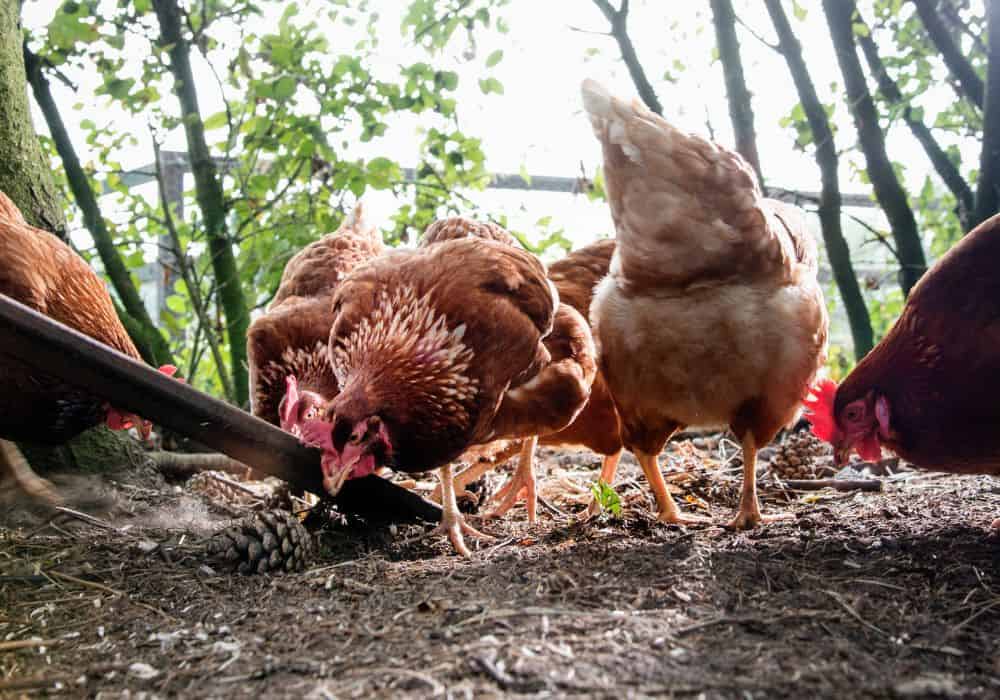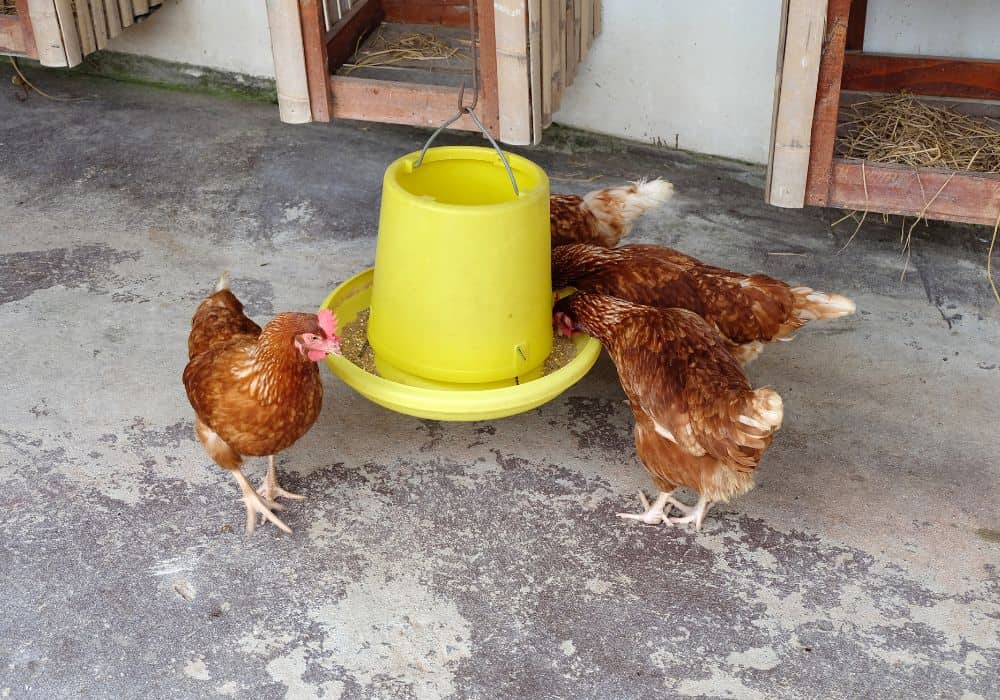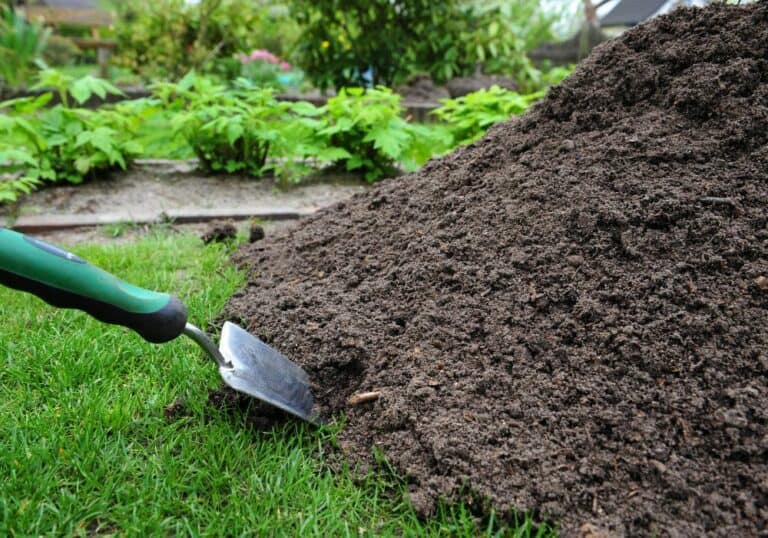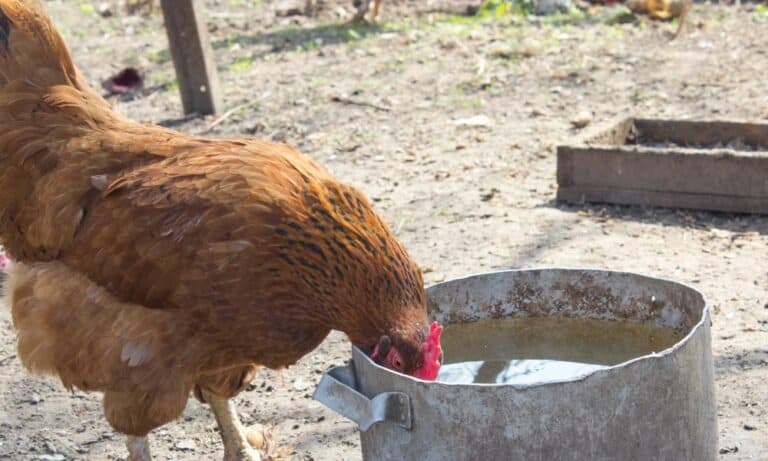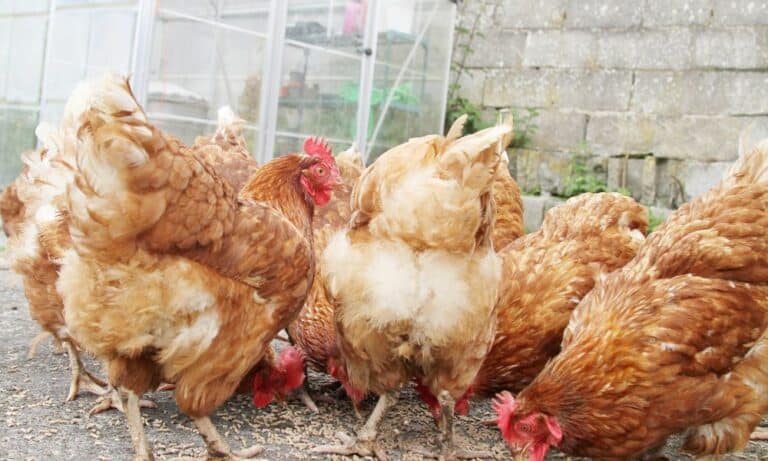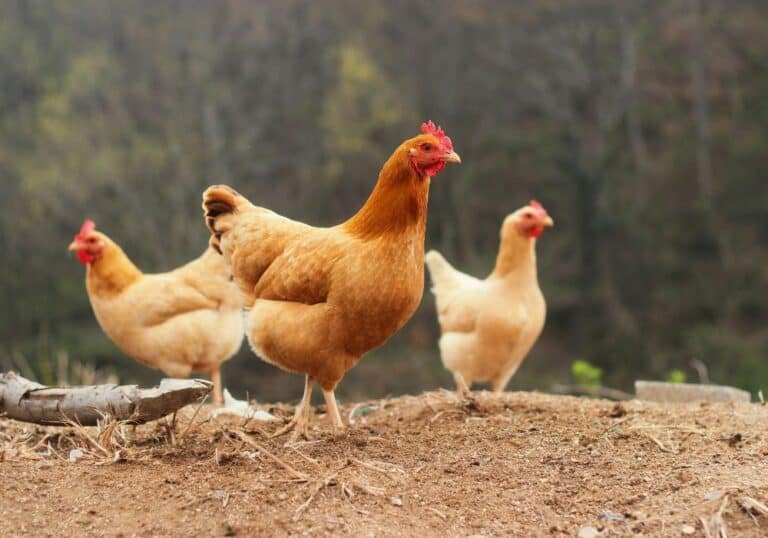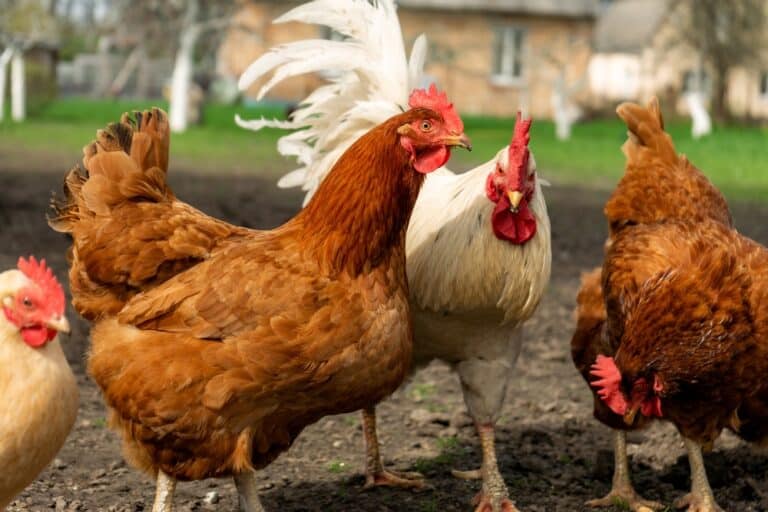If you live on a fully functioning farm, there’s probably a lot of cheese to go around. Cheese is one of the most popular food not just in the grocery’s dairy section, but in any American home. Its rich, creamy texture and salty, satisfying flavor is favorite of families everywhere.
It’s no secret that humans love cheese. But do chickens feel the same way about this delicious treat? Can chickens eat cheese safely in the first place? The answer is pretty complicated, but we’re here to walk you through it.
In this guide, we’ll tell you all about whether chickens can safely eat cheese, what potential benefits they can provide, and what cheeses to serve your flock. But we’ll also be realistic and talk about the risks of feeding your birds too much of it.
Read on to find out more and know once and for all—can chickens eat cheese?
So, is It Safe to Feed Cheese to Chickens?
The diet of chickens usually consists mostly of regular commercial chicken feed that is laid out for them daily. Some chicken raisers will allow their free-range chickens to forage for seeds, insects, and small animals in the yard. But did you know that chickens can eat food from the kitchen too?
Chickens love eating table scraps, especially ones that are healthy in vitamins and minerals. Some of their favorite “human” food include berries, kale, broccoli, lettuce, and oats. All these are nutrient-dense and healthy; does cheese even stand a chance to be incorporated into their diet?
Let’s cut to the chase—yes, chickens can definitely eat cheese! Cheese is rich in protein, calcium, and many other vitamins and minerals that your chickens need for their growth and development. But there are multiple caveats to this.
Cheese is safe to feed to backyard chickens as long as it’s done so in moderation. Cheese is fatty and salty, and it’s not the healthiest food option for your flock. So, only a tiny bit at a time is a good way to get them to taste cheese.
A good rule to go by is that your chickens’ diet should only consist of 10% treats. And most of their treats should be healthy fruits and vegetables, so put their cheese intake at about 4-5% at most. Give it to them occasionally only; perhaps once or twice a week.
You also shouldn’t be feeding all kinds of cheeses to your chickens. A chicken’s body isn’t designed to digest every kind of cheese. For the most part, it should only be organic cheeses (like cheddar, mozzarella, and goat’s cheese), not processed cheese or snacks with cheese in them.
The Benefits of Feeding Your Chickens Cheese
1. It’s rich in vitamins and minerals
Although cheese is sometimes known as a naughty but yummy little snack, it’s abundant in vitamins and minerals that chickens need to be strong and healthy. This is the case for organic cheese made straight from the source, not processed cheese made with preservatives and fillers.
Here are just some of the nutrients you can find in most cheeses:
- Vitamin B12: Boosts blood and nerve health, which helps prevent anemia
- Riboflavin: Improves metabolism and increases energy production
- Zinc: Helps in wound healing and boosting the immune system
- Selenium: Significantly improves the egg production and hatchability of hens
2. It’s an amazing source of protein
Protein is a huge part of any chicken’s diet. It’s a must for their growth and development early on in life, which is why a starter feed is usually made with around 20% protein.
Adult chickens also benefit from protein when it comes to growing strong feathers. In hens, protein is needed for healthy egg-laying.
Cheese is rich in a protein called casein—a slow-digesting protein that is packed with amino acids that can help your chickens grow strong and healthy. So, although your chickens’ feed is likely packed with protein already, you can give them cheese as a snack to give them more.
Not only can the protein in cheese aid in their body’s strength and development, but it can also boost their energy levels at the farm.
3. It has lots of calcium for bone health
Aside from improving bone health, calcium promotes healthy egg-laying. Hens with a calcium deficiency might have soft eggshells that easily crack. Sadly, chickens don’t produce calcium in their bodies, so they need it as a supplement to their diet. That’s where cheese comes in.
People easily associate calcium with other dairy products like milk, but did you know that cheese is also rich in this mineral? Giving it to your chickens as a treat can help strengthen their bones and make their eggs sturdier and more high-quality.
4. It has probiotics to boost digestive health
Any chicken farmer knows that chickens are susceptible to digestive issues, like diarrhea. Probiotics are good bacteria that help improve gut health, leading to fewer problems with digestion. It’s found in foods like yogurt, fermented vegetables, and you guessed it—cheese.
Today, more chicken raisers are adding probiotics to their chickens’ diet because of their excellent health benefits. With proper digestion thanks to probiotics, chickens are less likely to get sick.
You’ll find probiotics in cheeses that are aged but not cooked or heated. These include the likes of cheddar, provolone, and Gouda cheese.
5. It can help broiler chickens gain weight
Cheese has a lot of healthy fats and is high in calories. This makes it a terrific snack to feed to broiler chickens that need to be fattened up so they can be processed into tender, juicy chicken meat. It’s especially helpful for birds that are having a hard time gaining weight.
That fat and calorie count of cheese also helps boost your chickens’ energy. They’ll be more excited to play and run around the yard after having cheese as a snack.
Of course, the key is moderation. If you give them too much cheese, they’ll instead feel lethargic and heavy. Give cheese to your chickens only in small amounts to avoid this.
The Risks of Feeding Your Chickens Cheese
With the high sodium and fat content of cheese, it’s no surprise that there are some downsides to feeding it to your chickens too, and they’re definitely big cons.
1. Weight gain and obesity
Cheese is extremely high in calories, which is why it’s recommended only as an occasional treat for chickens. If you feed your flock too much cheese, they can gain too much weight, which can lead to obesity.
Being too fat can be detrimental to your chickens. Obesity is a common cause of sudden chicken death syndrome. It can also cause fatty liver syndrome, which can lead to death. They’ll also be more vulnerable to illnesses like heart disease or heat stroke.
Obesity can also have dire consequences for the productivity of your farm. Unhealthy chickens will have decreased fertility and might have trouble laying eggs.
2. Diarrhea and other digestion issues
Although cheese is safe to feed your birds, the truth of the matter is that chickens’ digestive systems aren’t meant to process dairy and lactose. Give them too much of these, and they can develop digestion problems, like an upset stomach, bloating, and diarrhea.
This is because chickens don’t have the enzymes that can process lactose. So, they can only handle cheese with lactose in small, controlled quantities. If you can, feed them cheeses without a lot of cow’s milk, like hard cheeses.
Four Types of Cheese Your Flock Will Love
1. Goat’s cheese
Cheese made from goat’s milk is a healthier alternative to cheese from cow’s milk. This is because there’s way less lactose in goat’s cheese, making it easier for chickens (and humans!) to digest.
It also has lower fat and cholesterol levels, so you can feed it to your chickens without worrying about them becoming overweight. Instead of the bad stuff, it has good vitamins, like vitamins D and B12, which are essential for boosting your chickens’ immune system.
2. Hard cheeses
Hard cheeses like parmesan and cheddar are terrific options for chickens too because they don’t have a lot of milk. This lowers the chances of them developing digestive issues as they peck on the cheese.
The thing with hard cheese is that you have to go the extra mile of cutting it up before serving it to your chickens. Hard cheese can be difficult to break apart and eat. It’s important to slice it up into thin pieces for your chickens to easily nibble on. You can also shred and grate the cheese.
Want to see how chickens react when you toss them a delicious piece of properly sliced hard cheese? Watch how happy chickens get when they’re fed slices of real cheddar cheese:
3. Soft cheeses
The easiest cheeses for chickens to eat are soft cheeses, like brie, Camembert, and gorgonzola cheese. Even if you serve the whole block of cheese to your birds, they will easily be able to bite and tear it apart because of the soft, creamy texture.
One of the best soft cheeses to give chickens is mozzarella cheese. This cheese is among the least acidic cheeses, so it’s a great option for chickens so that you don’t have to worry about digestive issues.
4. Moldy cheese
Many people aren’t big fans of blue cheese, but do you know that it’s excellent for health? Blue cheese is made with cultured penicillin, giving it amazing antibacterial properties that help flush out toxins from your chickens’ bodies.
Try feeding your chickens some moldy cheese just to see how they like it. If they don’t have any negative reactions to the cheese, feel free to feed it to them more while sticking to the 4-5% rule.
Cheeses to Avoid Feeding Your Chickens
Of course, while there are cheeses that your chickens will love and benefit from, there are also cheeses that you must avoid. Remember, chickens are very sensitive to what they eat. It’s important that when feeding them cheese, you only give them what you know they can handle.
Here are some of the cheese types to avoid giving your chickens:
1. Wet cheeses
Chickens are better at digesting dry, solid foods. That means wet cheeses like ricotta or cottage cheese might give them digestive issues. Although they’re technically healthy options for any animal, you should think twice about serving them to your chickens who are prone to getting diarrhea.
2. Processed cheese
Avoid giving your chickens processed cheeses that are laced with preservatives and other fillers that can be harmful to their health. These include cheese sticks, cream cheese spreads, and single cheese slices for sandwiches.
If you’re thinking of letting your chickens nibble at cheese, give them the real deal. Organic cheeses like cheddar, parmesan, Gouda, mozzarella, and more are the best options for your flock.
3. Cheese rinds
If you produce cheese on your farm, you’re likely to have a lot of cheese rinds around. Although these rinds aren’t in any way toxic, they may have a hard texture. This makes it difficult for chickens to chew and digest, so it’s best to stay away from them.
Plus, cheese rinds will often have remnants of cloth fibers and wax coatings from the cheesemaking process. This can cause issues with your chickens’ health later on.
4. Cheese-flavored snacks
This goes without saying but feeding your chickens cheese-flavored chips or popcorn is a huge no-no. These foods are made with high amounts of sodium and synthetic flavorings, which aren’t good for chickens.
Conclusion
Chickens can eat some cheeses, but not all kinds of cheese. This treat is full of calcium, protein, and healthy fats, which are incredibly beneficial for many chickens.
However, there are also a lot of risks associated with feeding your chicken flock some cheese, like weight gain, obesity, a fatty liver, and digestive issues. So, make it a point to give your chickens a cheesy treat only once a week—twice at most.
Stick to real cheese and not processed cheesy snacks, and your chickens will enjoy this occasional treat. Just make sure you give it to them in moderation and in tiny, cut-up pieces, and they’ll be happy and healthy.




